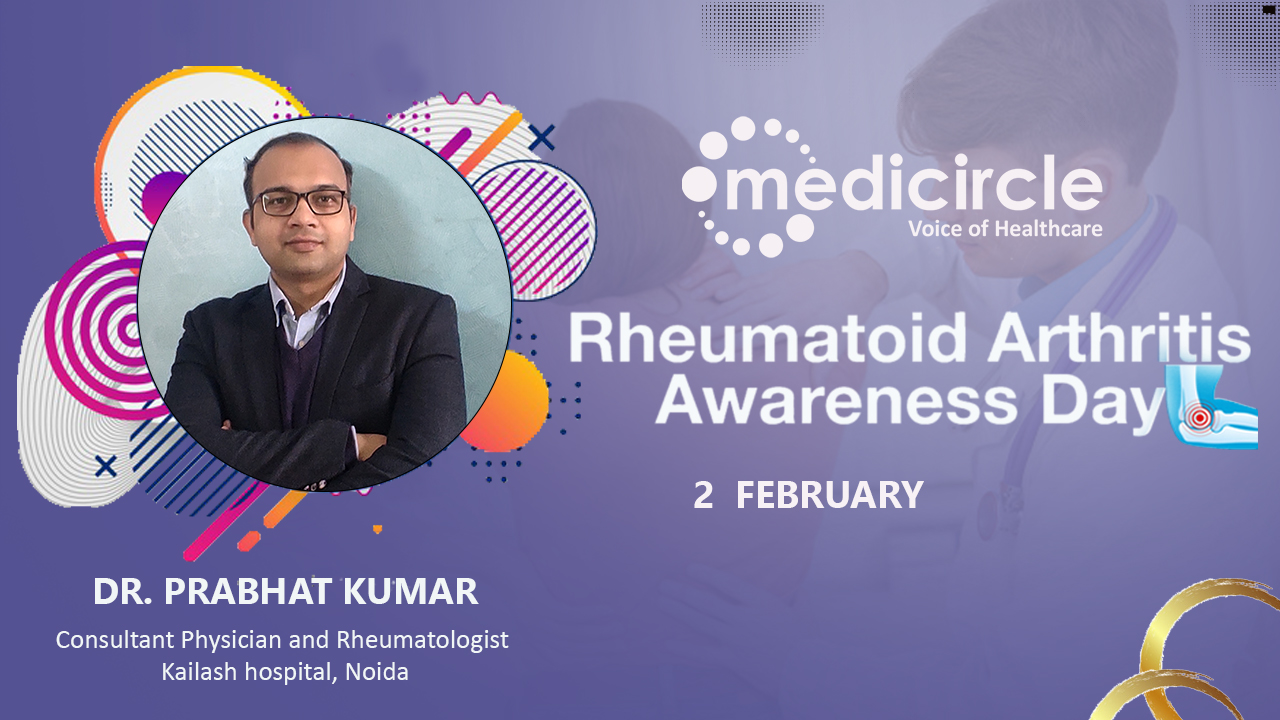Rheumatoid arthritis (RA) is estimated to affect approximately 0.24 to 1 percent of the Indian population and is considered to be twice as common in women compared to men. It affects more than 180 million people in India; the prevalence is higher than many well-known diseases such as diabetes, AIDS, and cancer. Around 14% of the Indian population seeks a doctor's help every year for this joint disease. Medicircle is conducting an exclusive series on RA to bring forward advice and suggestions directly from the specialists.
Dr. Prabhat Kumar is a Consultant Physician and a Rheumatologist at Kailash Hospital, Noida. He has been an Assistant Professor of Medicine at All India Institute of Medical Sciences in New Delhi previously. Areas that interest him are infectious diseases and rheumatological disorders.
Kailash Hospital Noida is committed to achieving patient satisfaction by providing services, at a reasonable cost, on humanitarian and compassionate grounds. Its group hospitals have state-of-the-art infrastructure, a large spectrum of clinical services, highly experienced and qualified professionals, dedicated staff, and a patient-friendly organizational culture.
Significant facts related to RA
Dr. Kumar sheds light on the following facts related to the disease:
- "It commonly occurs between 25-45 years of age
- Affects females more than males
- Symmetrical Pain or Inflammation of joints – both sides are simultaneously involved
- Gradual onset
- Pains are initially more prevalent in smaller joints of hands
- Early morning stiffness – Patients start feeling better only after few hours of waking up – after having spent some time doing very basic activities or after having a bath with warm water.
- Rheumatoid arthritis starts with smaller joints and rarely affects large joints. But if it does then it affects joints of the elbow, shoulder, knee, etc.
- There can be swollen and tender joints – immense pain when pressed
- It’s a chronic autoimmune disease that can affect many other organs like the heart, eyes, and skin and lead to complications if not treated on time
- If the joint pain is persisting for more than a duration of 4 weeks then it is extremely important to consult a specialist,"says Dr. Kumar.
Myths related to RA
Dr. Kumar informs, “Many people say that certain food items are triggering their joint pain. If it's so, he/she should avoid it but it's not like that the particular food item would trigger pain in other patients too. Also, unless the doctor advises do not think that taking vitamin supplements on your own is going to help. It might harm you in the long run than doing good. Doctors will themselves identify deficiencies and if required will let the patients know if food supplements are required or not. Just follow a healthy diet," advises Dr. Kumar.
RA is a treatable disease
Dr. Kumar points out, "there is a difference between curable disease and treatable disease. Rheumatoid arthritis is a treatable disease. It’s a genetic autoimmune disease that will remain life-long but early diagnosis and treatment will help you to have better control over it with aggressive treatment."
99 percent people get benefits from allopathic medicines
Dr. Kumar informs, "Some people avoid allopathic medicines or are not aware that such medicines are available. In absence of drugs at right time, vital organs start getting affected like many people get prone to heart attacks as this autoimmune disease blocks the arteries of the heart. Medical science has improved a lot in the last 2 decades. Earlier no drugs were available to treat arthritis but now with the help of pocket-friendly drugs it can be treated easily. If those drugs are not effective then some costlier medicines are available too to help you out,” ensures Dr. Kumar.
Change the thought process
Dr. Kumar suggests staying away from some thought processes that would ruin conditions further:
- "Do not unnecessarily delay your treatment and do not assume that treatment is not possible - Many people do not reach out to a rheumatologist for about 18 to 24 months which is too much of a delay. An elderly lady was above 60 years of age and was suffering from crippling deformities. When asked about the reason for not reaching out to a doctor for the last 30 years, she replied, that she assumed that her disease is not treatable.
- Avoid taking alternative medicines with allopathy or being dependent on just alternative medicines – This makes the situation worse.
- Avoiding reaching out to a doctor on time does not just affect quality of lifestyle but makes your life lesser by 7-8 years," explains Dr. Kumar.
(Edited by Amrita Priya)

 “By delay in consulting a specialist, one can have 7-8 years of lesser life,†says Dr. Prabhat Kumar, Consultant Physician, and Rheumatologist, Kailash Hospital, Noida.
“By delay in consulting a specialist, one can have 7-8 years of lesser life,†says Dr. Prabhat Kumar, Consultant Physician, and Rheumatologist, Kailash Hospital, Noida. 






.jpeg)


.jpg)









.jpeg)





.jpg)




.png)



